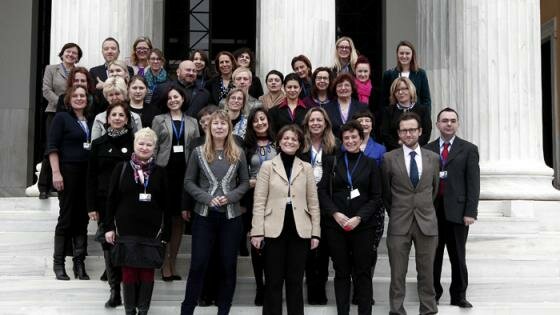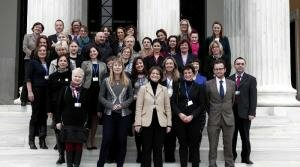- EPSCOEmployment, Social Policy, Health and Consumer Affairs Council (EPSCO)
Europe’s urgent need for a growth-sensitive policy on gender equality
A meeting of the High-Level Working Group on Gender Mainstreaming took place at Zappeion Megaron, in Athens on 6-7 February 2014. The meeting, which held under the Greek Presidency of the EU Council, was attended by state authorities in charge of gender equality in the 28 Member States, officials of the European Commission, the Secretariat of the Council, and the European Institute for Gender Equality (EIGE). The aim of the meeting was the coordination of action plans of the current tripartite Presidency in the field of gender equality in the European Union.
During the two-day meeting it was highlighted that the “equal participation of women in the economy and the efforts to boost growth should be a principle concern of an up-to-date gender equality policy in the European Union at this point in time”.
As a follow-up to the Beijing Platform for Action, the meeting focused on the critical area of ‘Women and Economy’ putting the spotlight on the need for the equal access of women in the labour market and in entrepreneurship, in terms that ensure appropriate working conditions and a work-home balance, as well as for promotion of economic rights and independence of women.
The selection of the topic by the Greek Presidency was not without a good reason, as was explained by the Secretary General for Gender Equality, Ms Vasso Kollia in her opening speech. The Secretary General pointed out that "the female population, especially in the member-states of the South is disproportionately affected by recession. The participation rates of women in the labour market remain consistently lower than those of men.” Kollia also stressed that “gender equality is a prerequisite for a strong democracy. However, equal participation of women in the production of knowledge, goods and services, and in every aspect of economic life is the only way towards growth and the well-being of our societies. This is crucial in order to achieve high levels of employment, productivity and social cohesion. This has been repetitively emphasized in the strategic documents of the European Commission".
During the meeting, representatives of EIGE presented, through a Report on the implementation of the Beijing Action Plan in the field of employment, the situation in terms of women’s employment in the European Union.
As the Secretary General for Gender Equality said, it is a priority of the Greek Presidency to convince women to turn to new technologies and the digital economy which despite high levels of unemployment are expected to create about 500,000 jobs until 2015. At the same time, the flexibility offered by digital technologies addresses the need for reconciliation between family and professional life. Kollia briefly referred to the initiative of the General Secretariat for Gender Equality titled ‘Digital Alliance for female employment based on Information and Communication Technologies’ which was developed along the action lines of the European Commission's "Grand Coalition for Digital Jobs".
A 15-strong partnership of public and private sector entities active in the field of employment and Information and Communication Technologies, will implement targeted actions on digital education and training, employment and entrepreneurship of women and young people, in the field of new technologies and the digital economy.
The Secretary General for Gender Equality praised the excellent cooperation between the members of the current tripartite Presidency (Ireland, Lithuania, Greece) as well as the important contribution of EIGE in developing an informed and coherent European policy on gender equality.
Kollia reiterated her commitment towards ensuring a smooth continuation of gender equality policies in cooperation with the next Tripartite Presidency (Italy, Latvia, Luxembourg). A constructive collaboration with the Italian government for the elimination of violence against women has already been launched.









